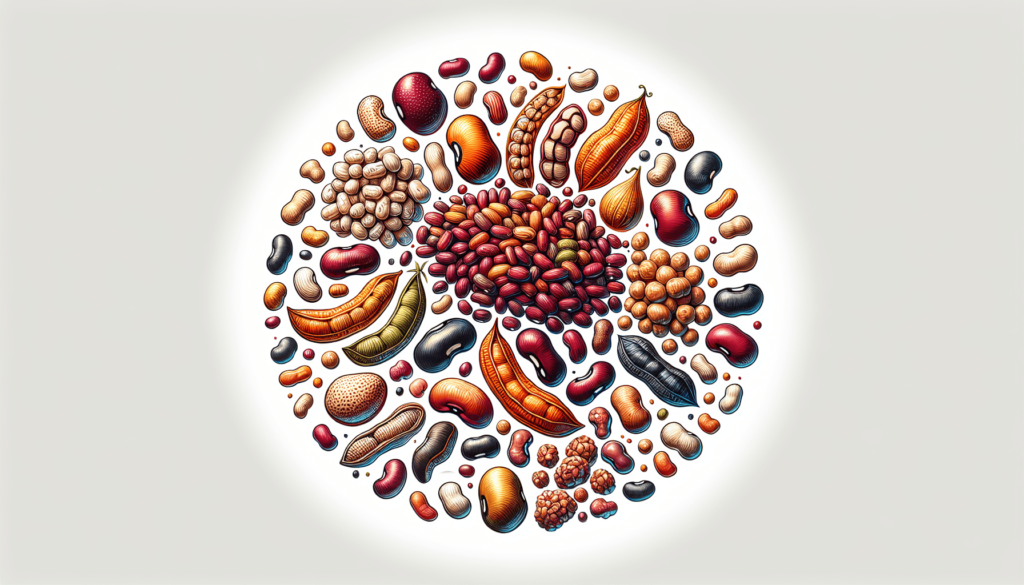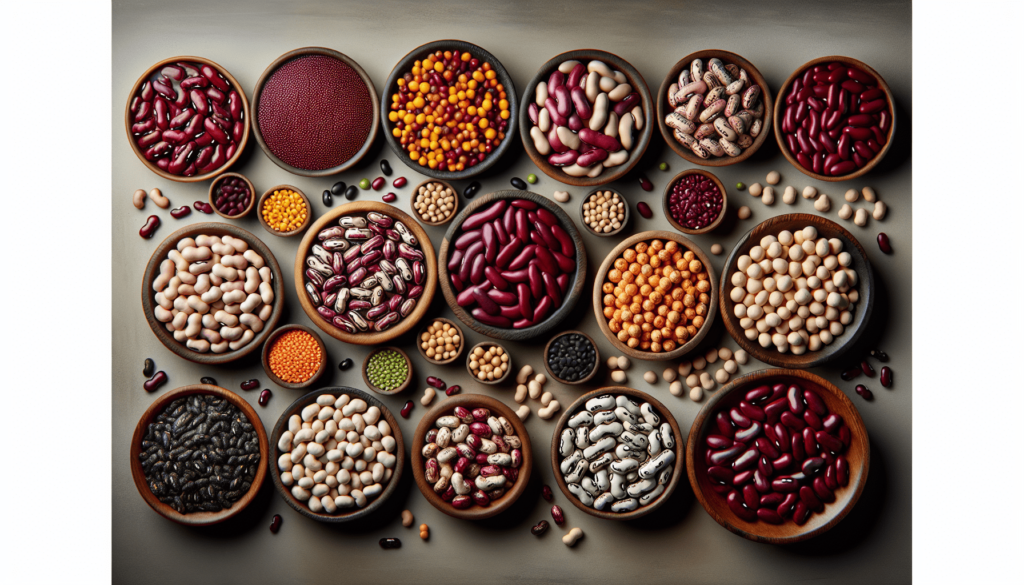Have you ever wondered about the nutritional benefits of different types of beans? From the protein-packed black beans to the fiber-rich chickpeas, beans offer a plethora of vitamins and minerals that can contribute to a well-rounded diet. In this article, we will explore the abundance of vitamins and minerals found in various types of beans, shedding light on the nutritional powerhouses that these legumes truly are. So, let’s dive in and discover the incredible health benefits that beans have to offer!
Common vitamins in beans
Beans are not only a great source of protein and fiber, but they also provide essential vitamins that are necessary for maintaining a healthy diet. Here are some common vitamins that can be found in various types of beans:
Vitamin B6
Vitamin B6, also known as pyridoxine, is a water-soluble vitamin that helps in brain development, maintaining a healthy immune system, and creating hemoglobin that carries oxygen to the cells. Beans, such as black beans, kidney beans, and garbanzo beans, are excellent sources of vitamin B6. By including beans in your diet, you can ensure you’re getting the necessary intake of this essential vitamin.
Vitamin C
Vitamin C, also known as ascorbic acid, is a powerful antioxidant that helps in strengthening the immune system, promoting collagen production, and assisting in the absorption of iron. Although beans are not as rich in vitamin C as citrus fruits, black beans and kidney beans still contain a fair amount of this vitamin. Adding a variety of beans to your diet can help supplement your vitamin C intake.
Vitamin K
Vitamin K is essential for blood clotting, strong bones, and heart health. It is often overlooked when it comes to vitamins, but it plays a crucial role in maintaining overall wellbeing. Many types of beans, including pinto beans and navy beans, provide a good amount of vitamin K. By including these beans in your meals, you can ensure you’re getting this important vitamin in your diet.
Folate
Folate, also known as vitamin B9, is important for cell growth and function, DNA synthesis, and the development of the neural tube during pregnancy. Beans, such as black beans, kidney beans, garbanzo beans, pinto beans, and white beans, are rich sources of folate. Including these beans in your meals can help meet your daily folate requirements, especially for pregnant women or those planning to conceive.
Thiamine
Thiamine, or vitamin B1, is involved in energy metabolism, nerve function, and the maintenance of a healthy cardiovascular system. Kidney beans and navy beans are excellent sources of thiamine. By incorporating these beans into your diet, you can ensure you’re getting an adequate amount of this essential vitamin.
Riboflavin
Riboflavin, or vitamin B2, is crucial for energy production, maintaining healthy eyes, and supporting the growth and repair of tissues. Lentils and pinto beans are rich sources of riboflavin. By including these beans in your meals, you can reap the benefits of this important vitamin.
Niacin
Niacin, or vitamin B3, is involved in energy metabolism, DNA repair, and the maintenance of a healthy cardiovascular system. Black beans and kidney beans are excellent sources of niacin. Including these beans in your diet can help ensure you’re meeting your daily niacin requirements.
Rich minerals in beans
In addition to vitamins, beans are also rich in minerals that are essential for various bodily functions. Here are some minerals that can be found in different types of beans:
Potassium
Potassium is an important mineral that helps in maintaining proper heart and muscle function, balancing fluid levels in the body, and supporting healthy blood pressure. Many types of beans, including black beans, kidney beans, and garbanzo beans, are excellent sources of potassium. By incorporating beans into your diet, you can ensure you’re getting an ample amount of this vital mineral.
Iron
Iron is crucial for the formation of hemoglobin, which carries oxygen to the cells, as well as for energy production and immune function. Black beans, kidney beans, and lentils are good sources of iron. By including these iron-rich beans in your meals, you can help prevent iron deficiency and support overall health.
Magnesium
Magnesium plays a key role in over 300 biochemical reactions in the body, including energy production, muscle and nerve function, and bone health. Black beans, garbanzo beans, lentils, and white beans are all sources of magnesium. By including these beans in your diet, you can help meet your daily magnesium requirements.
Phosphorus
Phosphorus is essential for bone and teeth health, energy production, and cell repair. Navy beans and pinto beans are good sources of phosphorus. By incorporating these beans into your meals, you can ensure you’re getting adequate amounts of this important mineral.
Copper
Copper is necessary for the formation of red blood cells, collagen production, and maintaining a healthy immune system. Black beans, kidney beans, and garbanzo beans are all sources of copper. By including these beans in your diet, you can help meet your daily copper needs.
Zinc
Zinc is important for immune function, wound healing, and cell division. Pinto beans and garbanzo beans are good sources of zinc. By including these zinc-rich beans in your meals, you can help support a healthy immune system and overall wellbeing.

Black beans and their nutritional profile
Black beans, also known as turtle beans, are a popular choice in many cuisines due to their rich flavor and versatility. In addition to being a great source of protein and fiber, black beans offer several essential vitamins and minerals.
High in fiber
Black beans are a fantastic source of dietary fiber, with each serving providing a significant portion of your daily recommended intake. Fiber is essential for maintaining a healthy digestive system, promoting bowel regularity, and controlling blood sugar levels. Including black beans in your meals can help you meet your fiber needs and support a healthy digestive system.
Rich in folate
Black beans are an excellent source of folate, a vitamin that is crucial for pregnant women as it helps in the development of the baby’s neural tube. Folate is also important for the production of red and white blood cells and the synthesis of DNA. By incorporating black beans into your diet, you can ensure you’re getting an adequate amount of folate.
Good source of iron
Iron is essential for the production of hemoglobin and the transport of oxygen throughout the body. Black beans are a good vegetarian source of iron, making them an ideal choice for individuals following a plant-based diet. By including black beans in your meals, you can support healthy iron levels and prevent iron deficiency.
Contain potassium and magnesium
Black beans are also a good source of potassium and magnesium, two minerals that play important roles in maintaining heart health, muscle function, and balancing fluid levels in the body. By adding black beans to your diet, you can increase your intake of these essential minerals and promote overall wellbeing.
Kidney beans and their nutritional profile
Kidney beans, named for their distinct kidney shape, are a popular choice in many dishes, such as chilies, soups, and salads. They not only add a hearty texture but also offer numerous health benefits due to their nutritional profile.
Packed with protein
Kidney beans are rich in protein, making them an excellent choice for individuals following a vegetarian or vegan diet. Protein is essential for building and repairing tissues, supporting immune function, and providing a feeling of fullness. By including kidney beans in your meals, you can ensure you’re getting an adequate amount of protein.
Good source of iron and folate
Iron and folate are two essential nutrients that kidney beans provide. Iron is important for the formation of red blood cells and the transport of oxygen throughout the body, while folate is necessary for cell growth and function. By incorporating kidney beans into your diet, you can support healthy iron levels and ensure you’re getting enough folate.
Rich in potassium
Kidney beans are a great source of potassium, a mineral that helps maintain proper heart and muscle function, balance fluid levels, and support healthy blood pressure. By adding kidney beans to your meals, you can increase your potassium intake and promote overall cardiovascular health.
Contain flavonoids
Kidney beans are rich in flavonoids, which are antioxidants that help protect the body against free radicals and oxidative stress. Flavonoids have been linked to various health benefits, including reduced inflammation and improved heart health. By including kidney beans in your diet, you can reap the benefits of these powerful antioxidants.

Garbanzo beans (Chickpeas) and their nutritional profile
Garbanzo beans, also known as chickpeas, are a staple in many cuisines, particularly in Mediterranean and Middle Eastern dishes. These versatile legumes offer a wide range of health benefits due to their impressive nutritional profile.
High in dietary fiber
Garbanzo beans are an excellent source of dietary fiber, which is important for maintaining a healthy digestive system and promoting bowel regularity. Including garbanzo beans in your diet can help prevent constipation and support overall digestive health.
Rich in protein and folate
Garbanzo beans are not only high in fiber but also rich in protein and folate. Protein is necessary for building and repairing tissues, while folate is important for cell growth and function, especially in pregnant women. By incorporating garbanzo beans into your diet, you can support your protein and folate requirements.
Good source of iron
Garbanzo beans are a good vegetarian source of iron, making them an excellent choice for individuals who follow plant-based diets. Iron is necessary for the production of red blood cells and the transport of oxygen throughout the body. By including garbanzo beans in your meals, you can support healthy iron levels and prevent iron deficiency.
Contain manganese and magnesium
Garbanzo beans are a rich source of manganese and magnesium, two minerals that play essential roles in various bodily functions. Manganese is involved in bone health and metabolism, while magnesium is important for energy production and muscle function. By adding garbanzo beans to your diet, you can increase your intake of these important minerals and support overall wellbeing.
Navy beans and their nutritional profile
Navy beans, also known as haricot beans, are small white beans that are named after their association with the United States Navy. These nutritious legumes offer a range of vitamins and minerals, making them an excellent addition to a balanced diet.
High in fiber and protein
Navy beans are high in both fiber and protein, which are important nutrients for maintaining a healthy diet. Fiber helps support digestion and bowel regularity, while protein is essential for building and repairing tissues and supporting immune function. By incorporating navy beans into your meals, you can ensure you’re getting an adequate amount of both fiber and protein.
Good source of folate and manganese
Navy beans are a good source of folate and manganese. Folate is important for cell growth and function, while manganese is involved in bone health and metabolism. By including navy beans in your diet, you can support these vital functions and ensure you’re getting a sufficient intake of folate and manganese.
Contain thiamine and phosphorus
Navy beans also contain thiamine, or vitamin B1, and phosphorus. Thiamine is involved in energy metabolism, nerve function, and cardiovascular health. Phosphorus is essential for bone and teeth health, as well as energy production. By adding navy beans to your meals, you can support these crucial functions and meet your daily requirements for thiamine and phosphorus.
Pinto beans and their nutritional profile
Pinto beans, named for their speckled appearance, are a popular choice in many Mexican and Southwestern dishes. These versatile legumes not only add a delicious flavor to your meals but also provide a range of essential nutrients.
Rich in fiber and protein
Pinto beans are rich in both fiber and protein, making them a great addition to a balanced diet. Fiber helps support digestive health and bowel regularity, while protein is necessary for building and repairing tissues and supporting immune function. By incorporating pinto beans into your meals, you can ensure you’re meeting your daily fiber and protein needs.
Good source of folate and manganese
Pinto beans are a good source of folate and manganese, two important nutrients for overall health. Folate is essential for cell growth and function, while manganese is involved in bone health and metabolism. By including pinto beans in your diet, you can support these vital functions and ensure you’re getting an adequate intake of folate and manganese.
Contain iron and potassium
Pinto beans also provide iron and potassium, two minerals that are essential for various bodily functions. Iron is necessary for the production of hemoglobin and the transport of oxygen, while potassium supports heart and muscle health and helps balance fluid levels in the body. By adding pinto beans to your meals, you can increase your intake of these important minerals and promote overall wellbeing.
Lentils and their nutritional profile
Lentils are small legumes that come in various colors, including green, brown, and red. They are a staple in many cuisines around the world and offer a wide range of health benefits due to their nutritional profile.
High in protein and dietary fiber
Lentils are renowned for their high protein and dietary fiber content, making them an excellent choice for individuals following a vegetarian or vegan diet. Protein is necessary for building and repairing tissues, while dietary fiber is important for maintaining a healthy digestive system and promoting bowel regularity. By incorporating lentils into your meals, you can ensure you’re getting an ample amount of both protein and fiber.
Rich in iron and folate
Lentils are also rich in iron and folate, two essential nutrients for overall health. Iron is crucial for the production of hemoglobin and the transport of oxygen throughout the body, while folate is important for cell growth and function. By adding lentils to your diet, you can support healthy iron levels and ensure you’re getting sufficient folate.
Good source of potassium
Lentils provide a good amount of potassium, a mineral that plays a vital role in maintaining heart and muscle health, balancing fluid levels, and supporting healthy blood pressure. By including lentils in your meals, you can increase your potassium intake and promote cardiovascular wellbeing.
Contain magnesium
Lentils are also a source of magnesium, a mineral that is involved in over 300 biochemical reactions in the body. Magnesium supports energy production, muscle and nerve function, and bone health. By adding lentils to your diet, you can increase your magnesium intake and support various bodily functions.
White beans and their nutritional profile
White beans, also known as cannellini beans, are a type of kidney bean with a creamy texture. They are commonly used in soups, stews, and salads and offer numerous health benefits due to their nutritional profile.
High in fiber and protein
White beans are high in both fiber and protein, making them an excellent addition to a balanced diet. Fiber helps support digestive health and bowel regularity, while protein is necessary for building and repairing tissues and supporting immune function. By incorporating white beans into your meals, you can ensure you’re getting adequate amounts of both fiber and protein.
Good source of folate and potassium
White beans are a good source of folate and potassium, two essential nutrients for overall health. Folate is necessary for cell growth and function, while potassium plays a crucial role in maintaining heart and muscle health, balancing fluid levels, and supporting healthy blood pressure. By including white beans in your diet, you can support these vital functions and ensure you’re getting sufficient folate and potassium.
Contain iron and magnesium
White beans also provide iron and magnesium, two minerals that are important for various bodily functions. Iron is necessary for the production of hemoglobin and the transport of oxygen, while magnesium supports energy production, muscle and nerve function, and bone health. By adding white beans to your meals, you can increase your intake of these important minerals and promote overall wellbeing.
Conclusion
In conclusion, different types of beans offer a varied nutritional content that includes essential vitamins and minerals. Whether you prefer black beans, kidney beans, garbanzo beans, navy beans, pinto beans, lentils, or white beans, incorporating these legumes into your diet can provide numerous health benefits.
From vitamin B6 and C to folate and thiamine, beans offer a wide range of vitamins that are necessary for maintaining a healthy diet. These vitamins play important roles in brain development, immune function, red blood cell production, and energy metabolism.
In terms of minerals, beans are rich in potassium, iron, magnesium, phosphorus, copper, and zinc. These minerals contribute to proper heart and muscle function, bone health, energy production, and various biochemical reactions in the body.
Each type of bean has its own unique nutritional profile. Black beans are high in fiber and folate, kidney beans are packed with protein and iron, garbanzo beans provide dietary fiber and manganese, navy beans are high in fiber and protein, pinto beans are rich in fiber and protein, lentils offer high protein and dietary fiber content, and white beans are high in fiber and protein.
By incorporating a variety of beans into your meals, you can reap the benefits of their diverse nutritional content. Whether you’re looking to meet your protein needs, increase your fiber intake, or support specific vitamins and minerals, beans can provide a nutritious and delicious addition to your diet. So, next time you’re planning your meals, don’t forget to include beans for a healthy and well-rounded diet.
